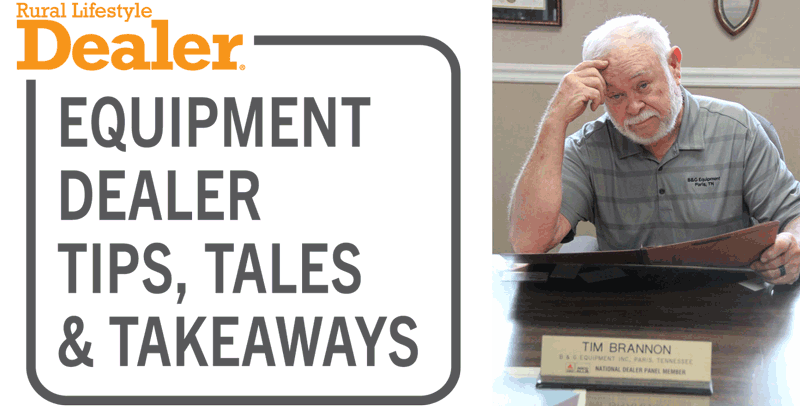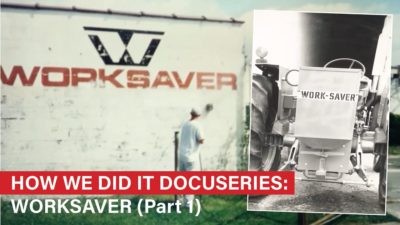Years ago, one of the things that caused insomnia was an issue of “parts shrinkage.” This is not the problem of a 10-year-old fuel cap that gets smaller and will no longer fit.
This is inventory, that is on paper, is supposed to be on the shelf — and it ain't. The reasons for inventory shrinkage are listed as:
- Theft
- Accounting, or counting, problems.
We propose in the farm implement business that theft (#1) is not an issue. Few young gang members conspire, it seems, to distract the parts salespersons and slip a few fan belts down their drawers and make a clean get-a-way. Has anyone ever been approached on the street by a person who flashes open a jacket exposing an array of V-belts, looks nervously around, and asks, "Hey man, want to buy a fan belt for a 6000 Ford Commander?" No, rather, it is a counting problem.
Counting cards in casinos can yield great rewards — especially if one can star in a movie about it. The same or greater reward can occur on the dealership level if everyone gets on board “counting parts.”
"Has anyone ever been approached on the street by a person who flashes open a jacket exposing an array of V-belts, looks nervously around, and asks, "Hey man, want to buy a fan belt for a 6000 Ford Commander?"
We are blessed to have a parts manager who loves to count, he even counts the kernels of corn in his soup, and he develops systems for counting. He explains it this way:
1. "NO ONE touches my parts unless it is put on a work order or counter ticket FIRST.” This counts a part OUT of inventory before human hands or minds can forget to charge it out. How many times does one go back and pick up a part to show to a customer or tech and ask "Is this correct?" Then say "what else to you need?" laying the part aside, looking for other needed parts or explanations.
The chances are good that someone could walk away with the part and “presto” it is gone. We must discipline everyone to put the part number on the ticket, thus taking it out of inventory, even if there is no intention to use it — again, before anyone touches any part. We have previously seen a parts salesperson write the part number on a scratch pad, go pull the parts and then put the parts on an invoice — don't do it or allow it to happen. Why? Too many chances for mistakes. We could list a bunch, but you are probably ahead of us in thinking of them.
2. Never order a part (or anything) that does not have a purchase order attached to it, unless it is a stock order. The purchase order number must be the counter ticket invoice number or the shop work order number.
Why use these as purchase order numbers? That means they are charged out — guaranteed — and the inventory is correctly counted. Often, we have called other dealers who “show” to have a hard-to-find or back-ordered part.
The conversation goes, "Do you have a xyz123 wobble wonker?" The answer is, "Well, it shows we do, but (the deadly but) we don't seem to have a location for it — can you hold a minute? Then one can hear in the background, "Hey Willard, it shows we got this wobble-widget but there is not a location for it. Didn't we put one on Billy Bob Bojangle's tractor last month? Yeah, I thought so.” Then back on the phone, "I'm sorry sir, we do not have the wobble thing-a-ma-jig.” Hang up.
Do you know why this part was missing? The customer called daily asking if his tractor was repaired as his cows were starving. The service manager was on the parts manager like white on rice to get the part, trace it or make sure it was actually ordered.
This PO's the parts guys to no end and they finally tell the service guys the parts will be in on a truck today. The truck arrives, it is attacked by the shop guys, the part is found and installed, the customer is called, arrives, extols his virtues on the service guys and drives away with the tractor and its now functional wobble-wonker.
All is back to normal in the shop and the parts manager is on the phone with the next emergency. The poor wobble-wonker is, of course billed to the dealership, the customer is not billed, and the mistake is not noticed until another dealer calls needing a wobble-wonker — if a call is ever made. It happens.
The final counting trifecta is perpetual inventory. It is a discipline that has to be learned. When going to the parts bin to retrieve the elusive cotter key, and the inventory says there is supposed to be 20 in the bin — count them. It is annoying, slow and make work to some, but count the dang things. If the count is over or under — fix it, as soon as the customer leaves, and have a battle royale until the guilty person who sold the last one is forced to go to confession to the feared/revered bookkeeper.
<>Counting parts, as mentioned earlier, is an odds-on favorite to increase your bottom line. Is our inventory perfect? No, but it is exponentially better than before Count Larry, the parts manager/counter, took the reins. He has plugged yet another leak in the profit boat.Til next time, wishing your smiles and profitability...
|
Told from the perspective of an in-the-trenches owner/operator — Tim Brannon of B&G Equipment, Paris, Tenn. — Equipment Dealer Tips, Tales & Takeaways shares knowledge, experiences and tips/lessons with fellow rural equipment dealerships throughout North America. Covering all aspects required of an equipment dealership general manager, Brannon will inform, entertain and provide a teachable moment for current — and future — leaders within equipment dealerships. |
 |
More From Tim Brannon
-
Burnout, of Dealership Minds…
-
Big Orange & The Coal Miner’s Daughter
- Find Your James Out There for Your Dealership
- The Perfect World of Parts
- Lessons from the 1980s … Working Capital, Part 2
- Working Capital, Part 1
- Communications: Now Repeat What I Just Said ...
- Loaded Up & Ready to Go
Equipment Dealer Tips, Tales & Takeaways is brought to you by the Solectrac.
It’s Solectrac's mission to lead the transition to zero-emissions regenerative agriculture, and utility operations with best-in-class technology for a safer, cleaner and healthier future.







Post a comment
Report Abusive Comment